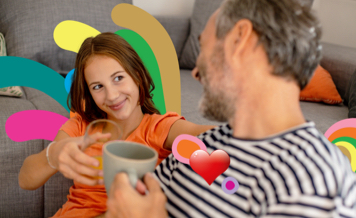Eating disorders: Symptoms, causes and treatments
Eating disorders can affect anyone, regardless of age, gender, shape or size. If you have obsessive thoughts and behaviours about food and weight, you’re not alone. It’s estimated that over 1 million Australians are currently living with an eating disorder.1
Jump to section: Symptoms | Types | Causes | Treatment | Where to get help
Symptoms of an eating disorder
People with eating disorders can experience a wide range of symptoms. Some signs could include:
- losing or gaining weight, or constant dieting
- overly worrying about body appearance or weight
- wearing baggy clothes
- moodiness
- sensitivity to cold
- withdrawing from social situations, especially to eat alone or in secret
- making excuses not to eat
- obsessive rituals around food and food preparation
- routinely going to the bathroom immediately after eating.
If you have an eating disorder you might also notice that you struggle to think rationally or concentrate. You might experience anxious or depressive symptoms.
If you notice any of these symptoms in yourself or someone you care about, speak to your GP. They’ll be able to offer you support and advise on the best next steps for your treatment.
Types of eating disorders
There are different types of eating disorders, and each one can negatively affect your health and how you feel about your body. Here are some of the most common types.
Anorexia nervosa
People with anorexia often eat very little, lose a lot of weight and are afraid of gaining weight. It is not the same as having a small appetite or being naturally lean.
Bulimia nervosa
Bulimia is when someone eats a large amount of food in a short time (binge eating), then tries to make up for it by vomiting, over-exercising or not eating afterwards.
Binge eating disorder
This is when someone often eats a large amount of food in one sitting and feels out of control, like they can’t stop. They may eat very quickly, or when they’re not hungry, or even after they’re full. Afterwards, they may feel guilty, upset or ashamed. Binge eating disorder is not the same as occasionally eating too much, such as during the festive season, but is a serious, repetitive behaviour due to mental illness.
Other specified feeding or eating disorder
This includes other eating problems that don’t exactly fit into the types above, but still cause distress or harm.
Even if someone doesn’t fit into any of these categories it’s important to seek help if they are struggling with obsessive or negative thoughts about food or their body, or if they’re feeling anxious or overwhelmed.

24/7 Medibank Mental Health Support
Medibank health insurance members can chat to a mental health professional about how they feel and ask questions about a range of mental health concerns for themselves or a loved one and get guidance on what they can do next. Chat online or call 1800 644 325 anytime of the day or night, 7 days a week at no extra cost.~
What causes an eating disorder?
Eating disorders are caused by a complex set of factors. Social, psychological and biological factors all play a part. The most important thing to remember is that your eating disorder is not your fault, it is a mental illness that can affect anybody.
Causes might include:
- social factors, such as the media and representations of the ‘ideal body’, peer pressure to look a certain way or have a certain body type, ‘body shaming’ or shame around eating, and low self-esteem or insecurity caused by social media
- major life changes, such as relationship breakdowns, the death of a loved one, moving to a new city or becoming a parent
- life stressors, such as issues with friends or family
- biological factors, such as genetics, or physical changes (like during adolescence), psychological factors such as low self-esteem, anxiety or depression.
How are eating disorders treated?
It’s normal to feel nervous, embarrassed or even ashamed when it comes to seeking treatment for an eating disorder. Remember, getting treatment as early as possible can reduce the severity and impact of an eating disorder, so seek help as soon as you notice any symptoms.
Your GP can help you set up a personalised treatment plan. Everyone is different, and what works for one person may not work for someone else. There are several types of effective treatment, and you may need to try a combination of approaches.
It’s usually recommended to get support from a team of health professionals such as a dietitian, social worker, psychologist, psychiatrist or others, depending on your individual needs. At some points, you may need extra support or more intensive treatment, and at other times you may need less. This is a normal part of recovery.
Recovery can be slow, but with the right help and support it is possible to manage your eating disorder and even recover completely.
If you’re supporting someone with an eating disorder
Supporting someone with an eating disorder can be challenging and can bring up lots of emotions for you too, but you don’t have to do it alone. The Butterfly Foundation offers free and confidential support for carers, including a helpline, online chat, support group and resources to help you understand what your loved one is going through.
Visit the website to learn more, or call 1800 33 467 (8am – midnight AEST/AEDT).

Where to go for help
If your life or someone else’s is in danger, call 000 immediately.
If you’re in distress and need help, call Lifeline on 13 11 14 for 24/7 crisis support.
For non-emergency support, your GP or regular health practitioner is often the best place to start. They will be able to assess your individual situation and recommend the best next steps for your recovery.
Medibank health insurance members can chat to a mental health professional about how they feel and ask questions about a range of mental health concerns for themselves or a loved one and get guidance on what they can do next. Chat online or call 1800 644 325 anytime of the day or night, 7 days a week at no extra cost.~
Remember that help is always available, no matter the situation.
How can we help?
I want to know how my cover supports mental health
I need help and want to talk
Related articles
Things you should know
~ Some referred services may involve out of pocket costs and waiting periods may apply.
While we hope you find this information helpful, please note that it is general in nature. It is not health advice, and is not tailored to meet your individual health needs. You should always consult a trusted health professional before making decisions about your health care. While we have prepared the information carefully, we can’t guarantee that it is accurate, complete or up-to-date. And while we may mention goods or services provided by others, we aren’t specifically endorsing them and can’t accept responsibility for them. For these reasons we are unable to accept responsibility for any loss that may be sustained from acting on this information (subject to applicable consumer guarantees).






